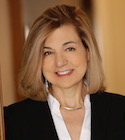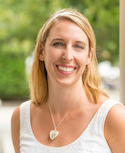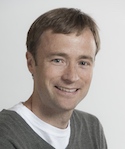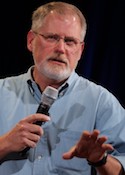How can we know our world in the face of efforts to undermine traditional sources of information … and in a time when citizens raise serious concerns about what and whom they can trust?
That question was explored on May 15, 2018, in a program organized by the Future of Information Alliance at The Phillips Collection as part of the University of Maryland’s partnership with the museum.
The program featured Margaret Sullivan of the Washington Post, whose columns have delved into issues around trust in traditional media; Jen Golbeck, a University of Maryland professor who researches organized efforts on social media to spread misinformation; and Jevin West, who teaches students at the University of Washington to navigate a world where misleading data lurk in surprisingly familiar places. The moderator was Dan Russell, who, as Google’s “director of user happiness,” researches ways that people search the web and teaches them do it better. There is more on each of them below.
[The video of this program below picks up after some opening remarks from Ira Chinoy, director of the FIA. Here’s how that first part of the program began.]
In the world in which we all grew up, getting together to talk about the future of facts would have seemed preposterous. And talking about the future of facts in a “post-truth” world? Even more preposterous. And yet here we all are.
“Post-truth” was the Oxford Dictionaries’ “word of the year” for 2016. It is defined as “relating to or denoting circumstances in which objective facts are less influential in shaping public opinion than appeals to emotion and personal belief.”
Of course, this is hardly the first era in which appeals to emotion and personal belief seem to be major drivers in public affairs. Yet we find ourselves in a time when all sorts of traditional venues for facts are being challenged for all sorts of reasons. This, in turn, generates a lot of angst about the fate of democracies and the process of decision-making on issues of public importance.
For people in fact-producing endeavors, like many of us here – from the news media, the sciences, the academy, and more – there are also important questions of trust, in addition to questions dealing with what can be done about intentional assaults on truth.
We have put this program together tonight in the hopes of generating new insights – and also in hopes of contemplating a way forward.
In fact, we have asked each of our wonderful speakers, at the conclusion of their remarks, to offer up a research question, something that should move this discussion of fact and “truthiness” forward. What should we be seeking to understand that we don’t now? How can the university help here?
Additional media: Tweets | Photos | jSchool News Post

Margaret Sullivan
A media columnist at the The Washington Post and former public editor for The New York Times, Sullivan talked about her efforts to understand the gaps between journalists’ ideals and the level of distrust they are encountering. This work included conversations with news consumers in places away from the nation’s media capitals. One thing she found was that people who expressed a general lack of trust in “the news media” gave a more positive answer when asked about their own news sources – often their local media. As a result, when it comes to information that news consumers have historically trusted, Sullivan is troubled by the decimation of local newsrooms.
“I think the biggest problem is that communities that have had a newspaper and three TV stations and maybe a second newspaper are now becoming starved for news. And some of them are becoming news deserts.”
Research question: “What are the ways that we could save local journalism? Because I see it as the biggest problem we have in establishing — in maintaining — a citizenry that is actually well informed and is able to believe in facts.”

Jen Golbeck
A computer scientist at the University of Maryland’s College of Information, Golbeck described the world of human “trolls,” automated “bots,” and systems of “AI” (artificial intelligence) that have been unleashed through social media in organized efforts to amplify false claims and disrupt the flow of reliable information. She explained how Russian operatives and others use those tools – in combination with personal information gleaned from social media — to sew discord.
“This is a massive infrastructure deployed against truth.”
Research question: “How do we adjust the interfaces of social media to make these things spread more poorly?”

Jevin West
A data scientist at the University of Washington and co-creator of a course titled “Calling Bullshit,” West talked about his work teaching students how, in this era of “big data” and ubiquitous “black box” algorithms, to detect misinformation that may be lurking in charts, graphs and numbers which have the “veneer of authority.”
“It’s this kind of BS that concerns me — because I argue that we can hide any sort of argument that we want underneath data in the same ways that we can with language and imagery…”
Research question: “How has ‘big data’ changed our definitions of truth? … Just because there’s lots of numbers behind the things that we’re collecting and we can do this at scale, how is that changing what we think of as fact?”

Dan Russell
As Google’s “director of user happiness,” Russell works to equip users with the skills they need to be effective at finding and employing the best sources of information. He served as moderator for this program. Noting the issues that each speaker had raised, he began the discussion with this question: “What can we do?”
Golbeck: “I murk around in these really terrible places online… I think if people get a sense of the volume, that can actually help. .. Here is this cancer that’s growing … I think showing that scope to people would make a difference.”
Sullivan: “People need to become news literate, and I think that we need to start that early – in elementary school – so that people have some sense of how to read or consume news … rather than sit back and let it wash over you.”
West: “In some states, like in the state of Washington, we are now requiring that media literacy be a part of the standard curriculum for students in high school… It’s an opportunity that we can use to teach some of these things, things like fact checking.”
After a wide-ranging discussion that included the audience, Russell asked the speakers one final question about the evening’s topic: “If you could imbue your students or your readers with one or two things that they really should know as a way of thinking about this, what would you have them know?”
Sullivan: “I would have them know how hard legitimate journalists try to get it right and how big a deal it is when they get it wrong and how much of a badge of dishonor it is to get it wrong – you know, how embarrassing it is. And, so, this idea that, oh, you get it wrong, you’re fake, is something that doesn’t resonate in the places I’ve ever worked.”
West: “If I could do anything, set them in a year of only learning critical reasoning … just questioning the world, critiquing the world in ways that go beyond just the absorption of the information that’s passing their posts every time … It would be just knowing how to think …”
Golbeck: “There are bad guys out there who want to do things to you … You’ve got to know that, and this trade-off between … giving stuff away in exchange for convenience, we don’t really know the value of what we’re giving away, so to think of a really bad adversary that you’re giving stuff to, because it’s going to make you more critical about what information you’re giving away.”
Veteran journalist Jamie McIntyre, originally slated to be a speaker, could not attend because of an out-of-town assignment. As a CNN correspondent on 9-11, McIntyre was inside the Pentagon when it was attacked. Excerpts of his reporting, taken out of context, became pillars of conspiracy theories that he found to be fiercely resistant to facts. He wrote about this in a master’s thesis titled “Elements of Disbelief: A Case Study of 9/11 Truthers and the Persistence of Misinformation in the Digital Age.” A note he sent to be read during the program matched up with panelists who talked about the importance of education in promoting critical thinking as an antidote to misinformation.
At the start of the program, Lucy Dalglish, dean of the Philip Merrill College of Journalism, University of Maryland, delivered a welcome on behalf of Provost Mary Ann Rankin and spoke about the collaboration between the university and The Phillips Collection that made it possible to hold this event at the museum.
This program was organized by the University of Maryland’s Future of Information Alliance in collaboration with these sponsors:
- The Andrew and Julie Klingenstein Family Fund
- The University of Maryland’s Philip Merrill College of Journalism
- The Univeristy of Maryland’s College of Information
- Division of Research, University of Maryland
- Bahá’í Chair for World Peace in the College of Behavioral and Social Sciences
- Center for American Politics and Citizenship
- The University of Maryland Libraries




